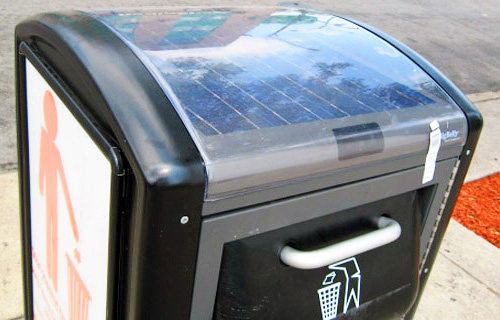
Philadelphia is making a move to save money, and it is coming through the help of inventive solar power. Their aim is to install 500 solar powered Big Belly self compacting garbage cans over the next couple months, saving the city about 12.9 million over the next 10 years.
How does it save money? Well, a typical public garbage can needs to be emptied about 19 times a week (I had no ideal), the Big Belly can go with needing emptying only about 5 times a week. On top of that, the intelligent trash can will phone the Street Department HQ when it needs to be emptied, saving any false runs. This ends up saving the city by cutting down the garbage workers needed to service the trash cans to 8 from the current staff of 33.
While the ideal is cool, it is a bit sad about people losing their jobs to a solar powered compacting trash can. You do have to take into account the jobs created by the creation of the garbage cans themselves (I would imagine they are a bit more complex to manufacture than your standard trash can, to say the least). Also these trash cans will require service, since mechanical things break down and power cells to hold a charge go flat. Will it offset all the jobs? Probably not, otherwise it would not be a cost saving gesture in the big picture. But in the long run it could provide for higher paying jobs that allows for high end training that could be used for more technical placement in other places. Hopefully.
via
From ancient Greece to the present day Western hemisphere, humans have thrown unwanted refuse onto streets, countrysides and remote places, unpunished. Prior to reforms within cities in the mid to late 1800s, sanitation was not a priority on governments' lists of things to do. Waste was disposed of by the roadside or in small local dumps. It was unsanitary for local inhabitants and the growing piles of waste led to the spread of disease. The only known pre-modern exception, however, was the Arab Empire, especially in Cordoba, al-Andalus, which had facilities for litter collection.
In the 14th century, the rise of waste in Europe helped contribute to the bubonic plague. Black rats, carrying the fleas which were the vectors for the plague, fed off biodegradable waste discarded by the public.
source: wikipedia



